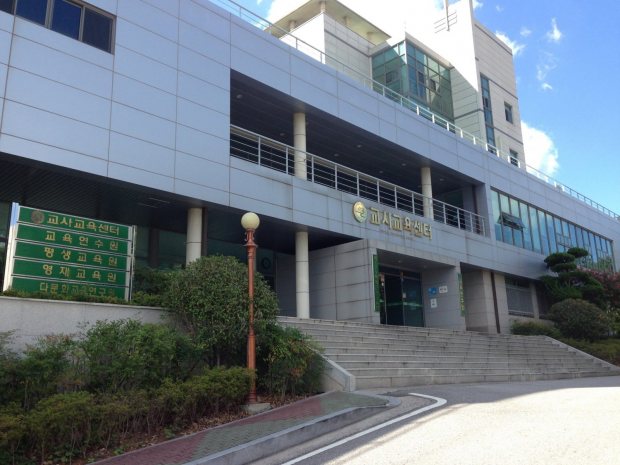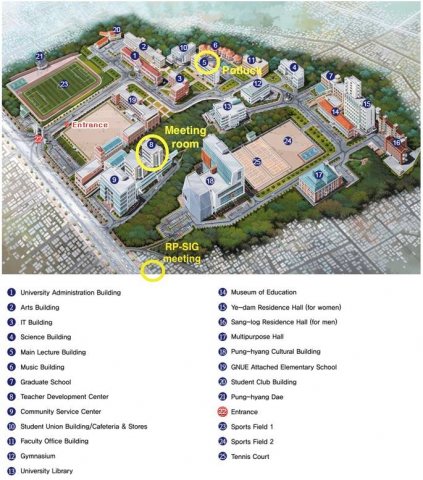
Gwangju-Jeonnam Chapter September Meeting
.
––– Morning Reflective Practice Session –––
Time: 11:00 am - 12:30 pm (2nd Sat., Sept. 9)
Location: Coffee Lab Mujii (formerly Aldersgate. NOT at Kenya Espresso Cafe), near GNUE. (Ground floor of 광주우리교회 Building. Map at bottom.)
ㅡ Topic: Investment and e-Journaling
ㅡ Facilitator 1: Jocelyn Wright (Learner and Teacher Investment)
ㅡ Facilitator 2: Maria Lisak (How to Capture, Organize, and Reflect on Teaching Artifacts Multimodally)
––– MAIN MEETING SCHEDULE –––
Time: 2nd Saturday, Seotember 9, 2017, 1:45 - 5:00 pm
Location: Gwangju National University of Education (GNUE), Teacher Training Center (교사교육센터) 1st Floor; Room 811. Detailed directions HERE.
1:45 pm: Sign-in and Meet-and-Greet (Admission: Free for newcomers. Membership welcomed.)
2:00 - 2:50 pm: Presentation
ㅡ Spotlight on Vocabulary
ㅡ Jessica Ives (Dongshin University, Naju, Jeonnam)
2:50 - 3:15 pm: Refreshment Break
3:15 - 4:15 pm: Collaborative Workshop
ㅡ Roundtable Discussions
ㅡ Facilitated by David Shaffer (Chapter Vice President)
4:15 - 4:45 pm: Swap-Shop Presentations
Share your Teaching Ideas, Classroom Activities, and Teaching Wisdom with the group.
(Everyone is encouraged to share [up to 5-6 min. each]. Short tidbits are welcomed. Handouts also welcomed.)
4:45 - 5:00 pm: Announcements / Drawing for Door Prizes / Closing
Presentation Summaries and Presenter Biodata
Spotlight on Vocabulary
By Jessica Ives
Learning a language is a complex process. Typically, grammar is seen as the most important component for learning a language. While grammar is certainly important, the role of vocabulary to convey the speaker’s message during communication is often left in the background. As Wilkins (1972) states, “without grammar, very little can be conveyed; without vocabulary, nothing can be conveyed” (p. 111). Generally, knowing vocabulary constitutes knowing the definition. However, is knowing only the definition enough? With this in mind, the focus of this workshop is to place a spotlight on the importance of vocabulary and how teachers can help students gain a deeper understanding of the words being learned. Based on Scott Thornbury’s ideas, this workshop will encompass a range of activities to address various factors related to teaching vocabulary: how to introduce vocabulary, multiple meanings of words, a word’s relationship with other words (collocation), and how to practice newly introduced vocabulary.
References
Thornbury, S. (2002). How to teach vocabulary. Harlow, UK: Pearson Education.
Wilkins, D. A. (1972). Linguistics in Language Teaching. Cambridge, MA: MIT Press.
The Presenter

Jessica Ives is from Niagara Falls, Canada. She is a professor at Dongshin University in Naju. Before teaching in Korea, she was an ESL Instructor at Brock University in St. Catharines, Ontario, Canada. She completed both her Bachelor of Arts (Honours) and Master of Arts in Applied Linguistics (TESL) at Brock University. She is interested in reflective practice and the sociolinguistic aspects of language teaching.
[TOP]
__________________________
Roundtable Discussions
Facilitated by David Shaffer
This session will be a set of Roundtable Discussions. Several roundtables (workstations) will be set up around the room, and every teacher will be expected to have prepared at least one item to present to the group for discussion – two or three or more items would be even better!
Here is a list of possible items to bring to the meeting for discussion and/or problem-solving:
• A problem that’s driving you up the wall (concerning ELT, students, colleagues, the administration, etc.).
• A question about the English language that makes you go “Hmmm...”
• A head-scratching question about why Korean learners make certain English mistakes.
• A teaching method- or technique-related question that you have.
• A half-finished idea that’s looking for help for completion.
• An activity or game you love (i.e., a swapshop type of item).
• An activity that seems like it will work fabulously, but has hidden pitfalls. (Things to beware of!)
• A longing to listen and help your fellow KOTESOL teachers!
[TOP]
___________________________
Photo: The Gwangju National University of Education (GNUE / 광주교육대학교), Teacher Training Center (교사교육센터), venue for our main meeting ㅡ 1st floor, Room 811.




